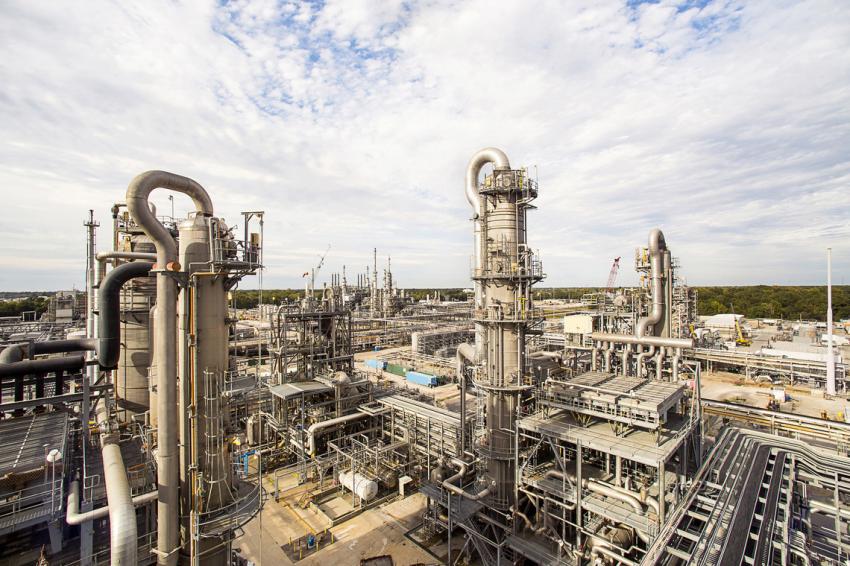Large Industrial Plant Manufacturing
Growth in Eastern Europe, Southeast Asia and the US, Fall off in Demand in China, India and Brazil
The member companies of the German Large Industrial Plant Manufacturers Group (AGAB) booked orders valued at €19.6 billion in 2014, a 11% decline compared to the previous year. "The industry is not satisfied with these results. However in a business environment characterized by sluggish growth, a series of geopolitical risks and strong fluctuations in the currency and commodity markets, our members succeeded in coping with the situation," commented Helmut Knauthe, AGAB spokesman and Chief Technology Officer at ThyssenKrupp Industrial Solutions in Frankfurt.
International
Order intake in international markets declined by 5% to €15.9 billion. The comparable figure for 2013 was €16.7 billion. In particular, demand in emerging markets was sluggish. Orders from China, India and Brazil in 2014 were at the lowest levels for many years. Bookings from Turkey, Indonesia and Mexico were also down. Southeast Asia and Eastern Europe were growth markets for the large industrial plant manufacturing industry. Several mega projects in the chemical industry boosted order intake by AGAB member companies to record levels in Russia. Demand in the US was again on a high level. Low energy prices are having a positive effect on orders, particularly in the metallurgy sector.
Domestic
Domestic demand fell by 18% in 2014 to €3.7 billion. This was primarily the result of the collapse of the market for fossil fuel power stations in Germany. Nevertheless, conventional power stations will still be needed in the future as a backup for volatile renewable energy. "A balanced energy and generation mix is essential to guarantee security of supply. Government policy must not lose sight of this necessity as it defines the energy transition roadmap," argues Knauthe.
Meeting Customer Expectations
Customers continue to expect more and more from large industrial plant manufacturers, and last year was no exception. Competitive pricing, excellent quality and quick project execution are taken for granted. Customers in emerging markets want more and more of the value-add to be generated locally. And the megaproject trend continued, particularly in the Middle East and the US.
AGAB member companies are reacting to these customer expectations comprehensively. They are optimizing existing risk and project management workflows and continuing to expand their international footprint by setting up service operations and production sites in core markets. "A broadly-based globalization strategy enables companies to take full advantage of existing business opportunities and has other advantages. Proximity to the customer provides valuable insights into current plant operations. Real time feedback can be routed to the product development process. In addition, in-country networks can help support business operations in other countries," reported Knauthe.
Expansion of the Service Business
Expansion of the service business also puts companies in a stronger competitive position. The service business currently generates around 15% of total turnover in the large industrial plant manufacturing industry. AGAB member companies intend to increase the industry average to 20% by 2018. "The service business has proven to be an effective strategy for creating a competitive advantage over Asian contractors. In some cases, companies submit bids for plant operation in addition to the sheer plant construction," reported the AGAB spokesman.
Export Credit Insurance
Several aspects of export credit insurance create barriers to competition, including the allowable%age of foreign costs and the unnecessarily high cost of manufacturing risk cover. In addition, competition outside of the OECD framework continues to intensify, and that raises its own set of challenges.
Because liquidity restrictions in the banking sector continue to create an impediment to long-term financing on large projects, risk coverage and financing are being provided to an increasing extent from the same source. This is becoming more and more of a disadvantage for German suppliers for whom a total financing solution is beyond reach. Current modifications to German export credit insurance are not keeping pace with the rate of change in the markets. "Government policy for export credit insurance must therefore activly seek and create new solutions," argues Knauthe.
Urgent Need for Investment In Infrastructure
Transport policy remains on the radar for large industrial plant manufacturing. The deterioration of the transport network in Germany is becoming increasingly obvious and the poor state of the infrastructure is impairing long-distance and heavy goods shipments. AGAB welcomes current investment plans including the federal bridge refurbishment program. "However the funds which have been earmarked for the period up to 2017 fall well short of the mark," commented Knauthe. "The money which has been allocated is only sufficient to refurbish less than 100 of Germany's 6,000 damaged bridges."
2015 Outlook: new Order Intake Expected to Remain Stable
Market expectations in the large industrial plant manufacturing industry are subdued. A large majority of AGAB member companies expect demand to remain stable at best or even decline during 2015. Muted growth prospects in core markets such as Brazil, China and Russia along with a significant number of local trouble spots are the main reasons for this cautious attitude. "There is however good news as well. American reindustrialization creates excellent opportunities, particularly for chemical plant suppliers. In addition, the devaluation of the euro increases the competitiveness of companies which have relatively high value-add in Europe. Finally, the service business is also expected to boost turnover," said Knauthe.
The VDMA Large Industrial Plant Manufacturers´ Group represents the interests of its members, and it is the largest network of German companies in the industry. Member companies have an annual order intake in Germany of 20 billion euros, and they employ more than 60,000 persons in Germany. With a worldwide market share of 16 per cent and an 80 per cent export quota, the companies provide major stimulus for the domestic supply market. More information is available here.





